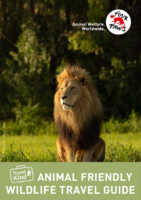
FOUR PAWS Launches Digital Animal Friendly Travel Guide
FOUR PAWS South Africa launches digital animal friendly travel guide on World Tourism Day
As travel returns across South Africa after the Covid-19 pandemic, animal welfare organisation FOUR PAWS is promoting the #TravelKind initiative by launching a digital animal friendly travel guide on World Tourism Day on the 27th of September.
The Director of FOUR PAWS in South Africa, Fiona Miles, says this time round, travellers should have a greater awareness to ensure their travelling is done in an ethical and responsible way that does not exploit animals and therefore lessens the risk of zoonotic disease transmission.
“#TravelKind means visiting destinations where no animal is exploited or harmed. This means avoiding facilities that keep animals in cruel conditions and allow wildlife interactions” says Miles.
The content of the guide includes a list of five recommended #TravelKind True Sanctuary destinations in South Africa, to help travellers make responsible choices when wanting to see wildlife, especially big cats, that have been rescued from inappropriate living conditions such as zoos, circuses, private keeping or even war zones. It also recommends five destinations to see animals in the wild across the country.
The FOUR PAWS #TravelKind guide warns that up close and personal interactions with wild animals are an easy sign that a facility is not driven by animal welfare or conservation principles and is likely to be exploitative.
Miles points out: “Wild animals like big cats that are hand raised by humans can never be released back into the wild and are only kept for entertainment purposes at some facilities. The explanation that they are kept in captivity for conservation reason is a ruse to exploit them.”
The FOUR PAWS #TravelKind Guide gives travellers 12 Do’s and Don’ts (see list at end of release) to avoid buying into exploitation while doing their travelling. Hints are given such as to support travel companies that offer non-invasive photo safaris, not to buy curios or souvenirs made from animal parts and to not support cruel animal exhibits or shows like circuses, performances with marine animals or any kind of show involving wild animals.
It also recommends visits to the five True Sanctuaries in South Africa. These True Sanctuaries is a group of wildlife sanctuaries who have united to pave the way for animal welfare and ethical big cat tourism. Included in the five recommendations is the FOUR PAWS Big Cat Sanctuary, LIONSROCK, where, as per True Sanctuaries principles, there are no interactions with animals permitted, no trading of big cats for profit and no breeding of big cats.
Miles adds, “These five sanctuaries are the only ethical way to view big cats in captivity in South Africa. The facilities house animals that have been rescued from facilities and situations that led to suffering such as inadequate zoos and cruel private keeping.”
Five wildlife destinations are also recommended where animals can be seen in the wild and travellers can enjoy the peace of mind that the animals are wild and free. According to Miles, the viewpoint remains that even though the sanctuaries provide the model solution for rescued animals, humankind should be working to eliminate the need for these facilities by choosing not to fuel wild animal exploitation. /END
12 Do’s and Don’ts of #TravelKind
1. Photograph wildlife in the wild while respecting their space. Don’t support businesses charging for photos with animals.
2. Enjoy animals in the wild where they belong and support companies that offer ecotourism trips or non-invasive photo safaris. Beware of places that offer trips that include trophy hunting, which is a cruel and unnecessary sport
3. Wild animals aren’t pets looking for belly scratches. Holding or petting wildlife is never kind to the animal, despite your best intentions. Close contact with wild animals could cause harm to their environment or to the animals themselves. And for your safety, this goes for stray or feral animals too.
4. Feeding wild animals harms their ability to find food naturally and teaches them to get dangerously close to humans.
5. Sometimes you’ll see animals in “sanctuaries” or poor-quality zoos. If you are worried about the welfare of these animals, report it immediately to your tour operator or a local welfare organisation. A true sanctuary does not breed animals, allow public contact with animals, and cares for the animals for the rest of their lives.
6. Elephants are wild animals and can’t be “tamed” without cruel treatment. Don’t try to ride them or visit businesses that offer this activity.
7. Do not buy trinkets or souvenirs made from animal parts. The illegal trade in wildlife parts and products includes items made with exotic leathers and fur, ivory and ornamental objects, food items, and traditional medicines. Buying these products encourages animal exploitation and poaching of animals from the wild.
8. Please don’t support cruel animal exhibits or shows like circuses, performances with marine mammals or any kind of show that involves wild animal performances. These animals are kept in inappropriate conditions and their performances are the result of dubious training methods based on domination or, at worst, violence. Please don’t support this torture.
9. Working mules and horses are commonplace in some countries. If you encounter those that are bred for work and are worried about their welfare, please report it immediately to a local welfare organisation or your tour operator.
10. It’s important when you’re abroad to be aware and take care in the presence of animals. Many strays and wild animals are fearful of humans and if approached, handled or attacked, can pose a real threat to you and your health. Rabies is a serious issue in some countries and can be transferred to humans. If bitten, wash the wound with soap and water, and seek medical attention immediately.
11. In some countries, a huge variety of animals can be found frequently on the menu. Avoid eating at places, including street vendors, that sell dog or cat meat, bush meat, and endangered species, such as shark fins, whale and turtle meat. Many animals endure cruel treatment to end up on a plate and there are also risks to your health with diseases, or even poison, being present in the meat, because of improper slaughter practises or hygiene.
12. Many countries and cities worldwide are providing more and more options for vegetarian and vegan travellers, so do look out for specialised establishments or at least veggie-friendly items indicated on the menu. It helps to learn food words like ‘vegetarian’ or ‘vegan’ in the local language, and smartphone apps like HappyCow and Vegman, or sites like Yelp, have lots of recommendations too!

Deidre Daniels
Public Relations Officer+27 (0)21 702 4277
+27 (0)78 675 8220
9B Bell Crescent, Westlake Business Park,
Green Building, Cape Town, 7945
A Public Relations professional with over eight years’ experience in fostering positive relationships between organisations and media.
FOUR PAWS in South Africa on Social Media
Stay up to date on this topic and on all FOUR PAWS activities on our social media channels:
or subscribe to FOUR PAWS in South Africa newsletter.
FOUR PAWS is the global animal welfare organisation for animals under direct human influence, which reveals suffering, rescues animals in need and protects them. Founded in 1988 in Vienna by Heli Dungler and friends, the organisation advocates for a world where humans treat animals with respect, empathy and understanding. The sustainable campaigns and projects of FOUR PAWS focus on companion animals including stray dogs and cats, farm animals and wild animals – such as bears, big cats and orangutans – kept in inappropriate conditions as well as in disaster and conflict zones. With offices in Australia, Austria, Belgium, Bulgaria, France, Germany, Kosovo, the Netherlands, Switzerland, South Africa, Thailand, Ukraine, the UK, the USA and Vietnam as well as sanctuaries for rescued animals in eleven countries, FOUR PAWS provides rapid help and long-term solutions. www.four-paws.org.za

